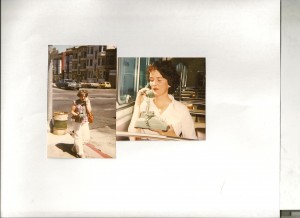Cat Up a Pole
It’s been pouring rain here in Seattle for about a week. Not the usual mild Seattle showers and mist, but a New York City kind of rain when you actually use an umbrella which a true Seattleite never does. People think it rains all the time in Seattle- fine, you go ahead and think that if it means you won’t move here because our traffic is a much bigger problem than our weather- but it really doesn’t. Except this week.
Last Thursday I came home at noon, wet and cold, to a garbled, semi-hysterical phone message from my friend Joan, the one with the theological chops. This was alarming. Joan never gets hysterical. She has the BVM in her pocket, after all. I caught the name Ileana—that’s her 20-something daughter—and the words “up a pole” and “24 hours.”
I called Joan at work where I elicited the crucial information I had not caught in the message. Chica. That’s Joan’s cat. OK, Chica had been up a telephone pole for 24 hours and Ileana had been trying to call me. Everyone in Joan’s office who had overheard the hysteria had assumed as I did, that Ileana was up a pole.
“I like that,” said Ileana. “All my mother’s friends think it’s plausible that I would be sitting on top of a telephone pole for 24 hours in a rainstorm.”
Chica, the cat, was indeed perched atop a telephone pole and looked mad in every sense of the word. Unfortunately the scene was familiar to me: the ladder, ten feet short, hitched up to the telephone pole. A broom with food tied to one end even though humans are the only animals who eat when they’re anxious.
My cat Winston scrambled up a telephone pole one hot 4th of July; initially frightened half way up by a dog, the rest of the way by fireworks. He sat there, puffed up to the size of a large raccoon. A bunch of us stood at the base of the pole and talked baby-talk to him. He attempted to descend head first, lost his grip and swung around til he was upright and hugging the pole. He came lumbering down like Winnie-the -Pooh as though it had been his plan all along which I seriously doubt. I love Winston, but he is a cat of little brain. Something primal must have kicked in.
Unfortunately, the only thing primal going on with Chica after 24 hours was the fear. Different weather, different cat, but still out of reach and crying fit to break your heart.
Ileana called City Light, the fire department, the vet, the emergency vet, animal control, pest control, and tree cutting services. No one would officially help, of course, but one always hopes to catch someone who is maybe already in the neighborhood, maybe has cats and a sympathetic heart, maybe has a Sagittarian sun. Nothing.
I called my neighbor, David, head of the Rat Mafia in our neighborhood. David is good in an emergency. He and his wife Grace, have removed more dead rats from my property and taken more live ones to humane executions than you need to know about. Rats on my property are always an emergency.
“You know Joan, who house-sat for you that Christmas? Her cat has been stuck on top a telephone pole for the last 24 hours being pelted with rain. They say they need an extension ladder. Do you think you could help?”
Five minutes later I heard David’s enormous pickup roar and saw it pull off the parking strip. Ten minutes later he was back and my phone was ringing.
“Your neighbor, David,” Ileana said, “He’s our hero.”
“Chica’s down?”
“Yeah, he just climbed up the ladder and grabbed her.”
“He likes beer,” I said. “And except for the beer, I think he’s gluten free.”
Chica spent the next 48 hours inside the box springs of Joan’s bed. She was receiving guests when I was over there on Saturday but she’s got an opaque look in her eyes, like she’s closed the door to her mind—such as it is.
Cats no longer teach kittens to descend backwards because their mothers didn’t teach them. As kittens, when they find themselves involved in long cylindrical phenomena like human legs, they dig in their needle-sharp little claws and hold on. Put like that and when I think of the ways we human beings often behave, maybe I shouldn’t be so quick to talk about cats of little brain.
 RSS Feed
RSS Feed

